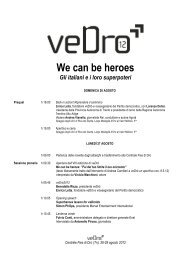democracy - Vision the Italian Think Tank
democracy - Vision the Italian Think Tank
democracy - Vision the Italian Think Tank
You also want an ePaper? Increase the reach of your titles
YUMPU automatically turns print PDFs into web optimized ePapers that Google loves.
<strong>democracy</strong> today and specifically of its assumption that citizenship is a conceptstrictly tied to <strong>the</strong> terrestrial dimension.It is also true, finally, that international business men, diplomats and professors of <strong>the</strong>best Universities, find in effect, o<strong>the</strong>r channels to “influence” <strong>the</strong> process offormation of <strong>the</strong> political will and even more that of lead pressure groups whosepower is often even greater that that of a simple parliamentarian. And, yet, thisconsideration defines with even greater clarity <strong>the</strong> terms of <strong>the</strong> question.To exclude a relevant and large part of <strong>the</strong> public opinion from <strong>the</strong> concretepossibility to participate in normal political processes means to leave such processesto <strong>the</strong> representation of <strong>the</strong> segment of population with medium or low possibilitiesand income. It also means postponing to a later moment, not institutional and thus notregulated moment <strong>the</strong> confrontation with <strong>the</strong> more advanced part of society.This entails a separation between on one hand <strong>the</strong> visible exercise of power which isincreasingly less relevant, and on <strong>the</strong> o<strong>the</strong>r, what instead happens outside thoseofficial forms of <strong>democracy</strong> 25 .Under <strong>the</strong>se circumstances, to be “public opinion” becomes increasingly useless andalong with <strong>the</strong> poverty of <strong>the</strong> democratic process, we see a driftage of “classes” andsegments – a process in which society as a whole disintegrates.The greater becomes <strong>the</strong> harm caused by <strong>the</strong> problem we are analyzing, <strong>the</strong> wider is<strong>the</strong> geographical scope of <strong>the</strong> institutions we are electing. In fact, <strong>the</strong> case of <strong>the</strong>European elections is a ra<strong>the</strong>r extreme case of failure of mechanisms that –notwithstanding <strong>the</strong>ir increasing inadequacy on a national level – have beenreplicated on a continental scale.Even more incomprehensible is that <strong>the</strong> elections of a supranational parliament(composed by parliamentarians, that in <strong>the</strong>ory, represent <strong>the</strong> entire Europeanpopulation) are done by computing <strong>the</strong> results of territorial-based competitions 26 .Between <strong>the</strong> victims of this mechanism <strong>the</strong>re is <strong>the</strong> Transnational European PoliticalParty that, for some time, many have considered necessary in order to “articulate apolitical European area” (objective that <strong>the</strong> same constitutional treaty has greatlymissed after identifying it as its major priority).Let’s try to understand what would happen to such a political party in an electoralcontext such as <strong>the</strong> current one.25 This is, partially <strong>the</strong> analysis that Negri and Hardt, in <strong>the</strong> “Impero”, 2002, have developed in outlining <strong>the</strong>characteristics of new imperial hegemony26 To this paradoxical results of <strong>the</strong> last European elections, <strong>Vision</strong> has dedicated <strong>the</strong> “European Election QuickCollection” accessible on www.vision-forum.org.26





